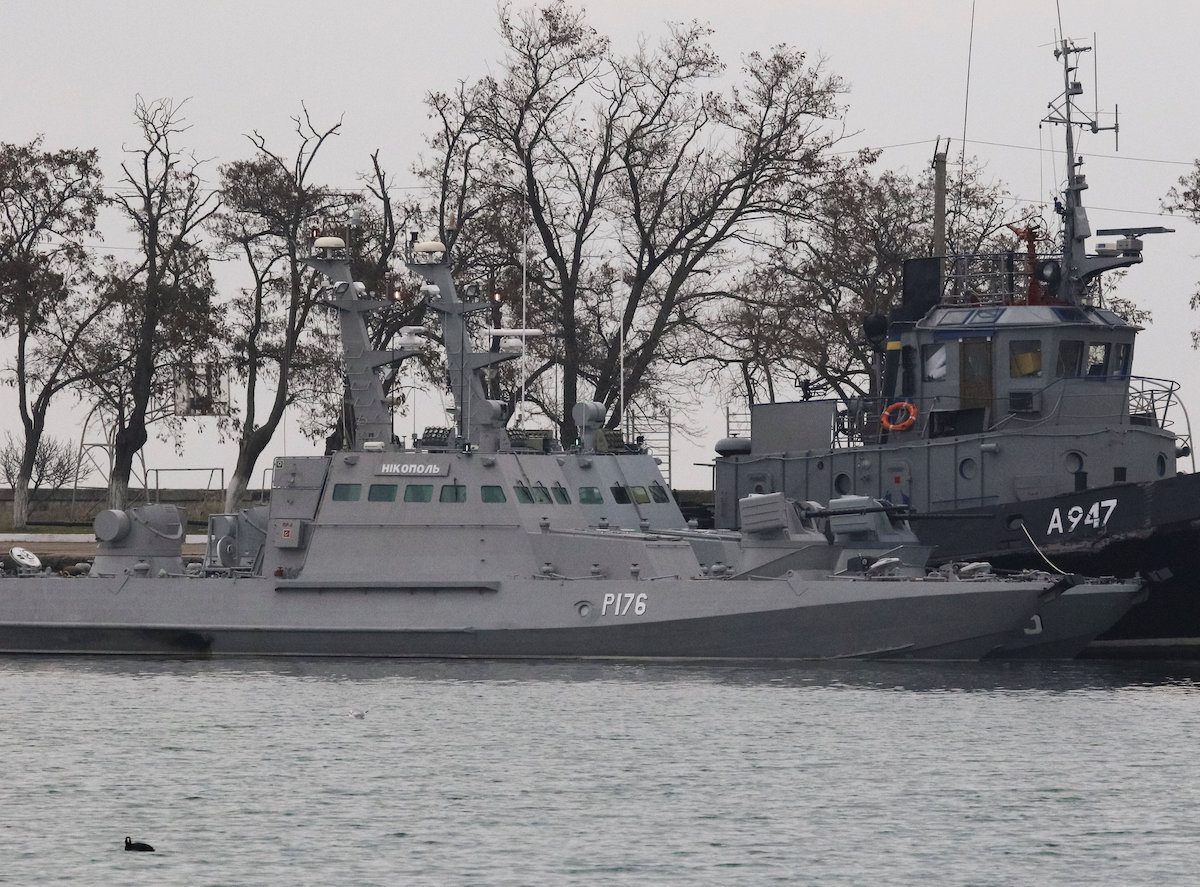REFILE – CORRECTING TO CRIMEA Seized Ukrainian ships, small armoured artillery ships and a tug boat, are seen anchored in a port of Kerch, Crimea November 26, 2018. REUTERS/Pavel Rebrov
 By Andrew Osborn and Natalia Zinets MOSCOW/KIEV, Nov 26 (Reuters) – Russia on Monday ignored Western calls to release three Ukrainian naval ships and their crews it fired on and captured near Crimea at the weekend and accused Kiev of plotting with its Western allies to provoke a conflict.
By Andrew Osborn and Natalia Zinets MOSCOW/KIEV, Nov 26 (Reuters) – Russia on Monday ignored Western calls to release three Ukrainian naval ships and their crews it fired on and captured near Crimea at the weekend and accused Kiev of plotting with its Western allies to provoke a conflict.
In Ukraine, where armed forces were on full combat alert, President Petro Poroshenko sought parliament’s approval to impose martial law from Wednesday to strengthen national defenses against possible “invasion” by Russia.
In a televised address, he assured skeptical lawmakers that his decree, which was to be put to a vote later on Monday, would not curb civil liberties or lead to a delay in elections scheduled for next year.
With relations still raw after Russia’s 2014 annexation of Crimea from Ukraine and its backing for a pro-Moscow insurgency in eastern Ukraine, the crisis risked pushing the two countries into open conflict and there were early signs it was reigniting Western calls for more sanctions on Moscow.
Russia’s rouble currency weakened 1.4 percent against the dollar in Moscow on Monday, its biggest one-day fall since Nov. 9, while Russian dollar-bonds fell.
Markets are highly sensitive to anything that could trigger new Western sanctions, and therefore weaken the Russian economy. A fall in the price of oil — Russia’s biggest source of revenue — has made its economy more vulnerable.
In a phone call with Poroshenko, NATO Secretary General Jens Stoltenberg offered the alliance’s “full support for Ukraine’s territorial integrity and sovereignty.” Ukraine is not a member of the U.S.-led military alliance though it aspires to membership.
Washington’s envoy to the United Nations warned Russia that its actions were an “outrageous violation of sovereign Ukrainian territory,” said sanctions on Russia would remain in place and any escalation by Moscow would only worsen ties.
The European Union, Britain, France, Poland, Denmark, and Canada all condemned what they called Russian aggression. German Chancellor Angela Merkel stressed the need for dialog.
The stand-off in the Azov Sea is more combustible now than at any time in the past four years as Ukraine has rebuilt its armed forces, previously in disarray, and has a new generation of commanders who are confident and have a point to prove.
“PROVOCATION”
Russia’s foreign ministry blamed Kiev for the crisis.
“It’s obvious that this painstakingly thought-through and planned provocation was aimed at igniting another source of tension in the region in order to create a pretext to ramp up sanctions against Russia,” it said in a statement.
“We’d like to warn the Ukrainian side that the policy of provoking a conflict with Russia in the area of the Sea of Azov and the Black Sea, which has been pursued by Kiev in coordination with the United States and the European Union, is fraught with serious consequences.”
Russia summoned the ranking diplomat at Kiev’s embassy in Moscow over the incident, the foreign ministry said.
In Kiev, Poroshenko said intelligence data suggested there was an extremely serious threat of a land-based operation against Ukraine by Russia.
“I have a document of intelligence in my hands … Here on several pages is a detailed description of all the forces of the enemy located at a distance of literally several dozens of kilometers from our border. Ready at any moment for an immediate invasion of Ukraine,” he said.
Martial law would “in the event of an invasion allow us to respond quickly, to mobilize all resources as quickly as possible,” he said.
But he rowed back from an earlier proposal to impose martial law for two months after several lawmakers voiced concern and he said his decree did not foresee any restrictions on the rights and freedoms of citizens or the introduction of censorship.
He dismissed “dirty speculation” by critics that he wanted to use the proposed measure to delay elections due for next year.
UKRAINIANS WOUNDED, VESSELS HELD
The crisis erupted when Russia’s border patrol boats belonging to Russia’s FSB security service seized two small Ukrainian armored artillery vessels and a tug boat after opening fire on them and wounding three sailors on Sunday.
The Ukrainian vessels had been trying to enter the Sea of Azov from the Black Sea via the narrow Kerch Strait that separates Crimea from the Russian mainland.
Interfax news agency quoted Russia’s human rights commissioner, Tatyana Moskalkova, as saying on Monday that 24 Ukrainian sailors were being detained. Three of the sailors were wounded but were not in a serious condition and were recovering in hospital.
A Reuters witness in Kerch, a port in Crimea, said the three Ukrainian vessels were being held there on Monday.
Domestic politics in Moscow and Kiev adds to the combustibility of the situation. Poroshenko faces a tough re-election fight early next year, with opinion polls showing him trailing his opponents.
Russian President Vladimir Putin has also seen his high approval rating fall because of unpopular domestic policies. In the past, successful military action beyond Russia’s borders has buoyed his popularity.
Tensions have been long brewing over the Azov Sea. Crimea, on the western shore, is now controlled by Moscow, the eastern shore is Russian territory, and the northern shore is controlled by Ukraine.
(Additional reporting by Tom Balmforth and Polina Ivanova in Moscow, Stine Buch Jacobsen in Copenhagen, Karin Strohecker in London, Joanna Plucinska in Warsaw, and European bureaux Writing by Andrew Osborn/Christian Lowe/Matthias Williams Editing by Richard Balmforth)
(c) Copyright Thomson Reuters 2018.

 Join The Club
Join The Club










